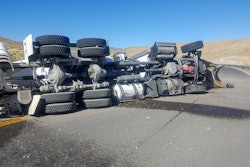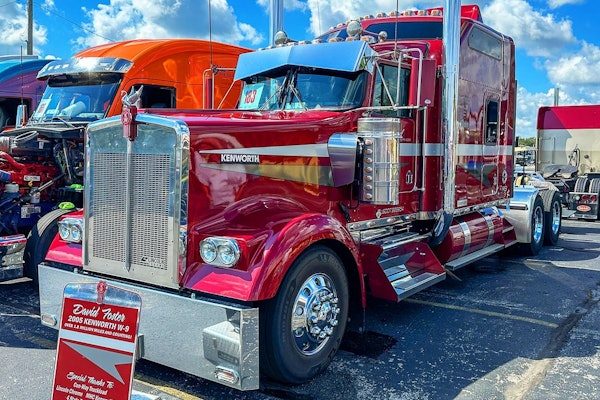 Is the cavalry coming for cargo thieves and double brokers? Some watchers believe the huge rise in theft numbers in recent times could lead to boosted enforcement against the latter, given fraud proliferation in freight networks.Source for chart: Verisk CargoNet
Is the cavalry coming for cargo thieves and double brokers? Some watchers believe the huge rise in theft numbers in recent times could lead to boosted enforcement against the latter, given fraud proliferation in freight networks.Source for chart: Verisk CargoNet
Seasoned owner-ops will know the common best practices to protect against cargo theft -- avoid known hotspots, don't tell anyone anything they don't need to know, and situational awareness at all times.
At this point in the double-brokering "fraud epidemic," as the Transportation Intermediaries Association's leader Anne Reinke called it, most owner-operators pulling freight off of load boards also have gotten schooled in ways to avoid getting swindled. But a new front in that battle, according to Scott Cornell, might just open up as big businesses like mega shippers finally feel the pain.
Cornell said that as thieves attack the U.S. freight industry with increasing frequency, the global market for stolen goods expands, and so too federal law enforcement's ire at the dire situation.

[Related: The double brokering scourge: How it happens, and ways to fight back]
"There's straight theft and strategic theft," Cornell said. "Straight theft is when thieves get to cargo wherever it sits, at drop-offs in port areas or truck stops, and physically steal the freight through pilferage, just taking part or the whole tractor-trailer. This is still the most common method" of theft reported to CargoNet.
A string of straight thefts took place in Philadelphia, for example, where a cargo theft ring held drivers at gunpoint while stealing seafood, electronics and even coins being hauled for a U.S. mint.
[Related: Walmart parking lot dimes heist: Philadelphia cargo theft ring busted]
That much hasn't changed, and the best practices for defending against this kind of theft still work.
"But the biggest increases we seen in the last 18 months have been in the strategic theft category, where they trick you into giving them the freight," said Cornell. Basically, a broker tenders a load to a fraudulent carrier, possibly using stolen identities, and then that carrier turns around and rebrokers the load out to a second, unwitting and legitimate carrier after changing the load's destination.
These thefts occur through identity theft, using real MC numbers to commit fraudulent activity, and double-brokering, he said. And what's behind the major uptick? The very same tech tools meant to revolutionize trucking and make it as frictionless and easy as tapping a button on your smartphone.
"A lot of the same things the supply chain put in place to be more efficient, effective and faster are the same things cargo thieves take advantage of," said Cornell. "Think about how much of the supply chain operates virtually. It's a big opportunity" not just for potential criminals looking over your shoulder, but the entire international online world of criminals
"They're targeting load boards, using fake emails and using IP phone numbers [internet-based phone numbers that can be made to look like any area code] in order to commit cargo theft," he said.
As a result, according to Cornell, the usual cargo theft hot spots a driver could expect have blurred and expanded across the country. No longer is it just Southern California Florida, and New Jersey, or inland ports like Atlanta and Chicago. Now places like Arizona, Wyoming, the Dakotas and Oklahoma are all climbing up the hotspots list, too. Darker-shaded states on the map outside the top three represent higher levels of activity.Veririsk CargoNet
Darker-shaded states on the map outside the top three represent higher levels of activity.Veririsk CargoNet
[Related: The double brokering scenarios that can result in cargo theft]
"Now virtual cargo thieves steal any freight they want regardless of where it is and regardless of where" the truck is, said Cornell. "I don’t have to put myself at risk to be physically present at a truck stop in Southern California, I can just pretend to be a freight broker online."
That's right, even the criminals get to work from home these days. And that criminal's home could be anywhere, too.
"One of the big changes we're seeing is a bigger international presence in some of the organized cargo theft rings," he said. Along with those international criminals come international sales of stolen goods. "Seven years ago, I'd tell you that six out of 10 stolen loads stay in the U.S. and are sold online or in flea markets or to a known fence. Now, six out of 10 being are moved out of the country."
Overdrive's own investigations into shady trucking companies and brokers have also often led overseas.
This spreads out the black market across borders and creates more demand for stolen U.S. goods, according to Cornell, and it "doesn't bode well for any indication that this is going to slow down soon."
In the event that a load gets double brokered and stolen, there's a chance a legitimate truck operator unwittingly involved still gets paid. Cornell said in his experience, truck drivers represent "some of the last real cowboys" who care deeply about their cargo being stolen, or being duped by a fake broker -- they're motivated to help catch the fraudster even if they get paid.
The ultimate victim of these double-brokered loads getting stolen and shipped off, though, are the shippers. Big companies like Apple, Walmart or Proctor and Gamble see their loads ripped off at an increasing rate.
To a small business trucker, the woes of a multi-billion dollar conglomerate might just sound like minor chords played on the world's smallest violin. But, according to Cornell, it could lead to some serious enforcement action against double brokering.
"I do think you’re going to see in general practice the federal government get more involved in non-theft related double brokering," he said. "What we are seeing is a bigger federal involvement in law enforcement. FBI and Homeland Security have really strong efforts on cargo theft and are getting involved and conducting strong investigations leading to pretty good arrests and recoveries."
At Travelers' October conference in Southern California, Cornell noted record attendance from both big-name shippers and the FBI and Homeland Security. Additionally, cargo theft statistics rely only on who actually reports being a victim. Cornell said 10 years ago, nobody wanted to admit it, but now there's growing momentum and incentive to talk about these incidents.









